NCSA’s SPIN Program Exposes Illinois Students to Innovative, High-Tech Research
November 30, 2017
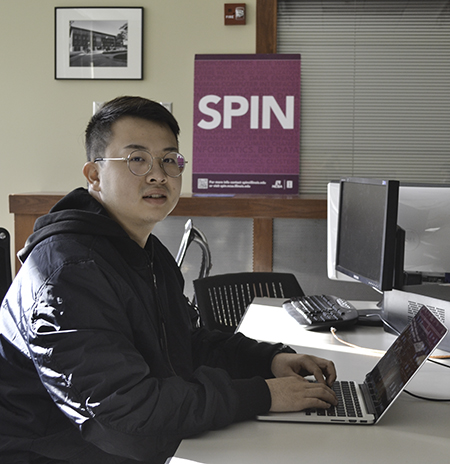
SPIN student Zekun Wei at work in NCSA's SPIN office. Mentored by Dr. Andre Schleife, Wei and two other SPIN students worked on "Incorporating Interactive virtual Reality Technology in an Educational Environment," a project involved with data vizualization for Schleife's Material Science course.
Illinois undergraduate students seeking to do challenging research on campus, especially related to cutting-edge new technology, need look no further than NCSA’s SPIN (Students Pushing Innovation) program. Begun in 2012, it was created to support undergraduate research on campus and also to provide access to new technology—high-performance computing, data analysis and visualization, or cybersecurity, to name several. The gist of the program? Students get to do cutting-edge research in new technologies mentored by world-class researchers— possibly using NCSA’s Blue Waters supercomputer.
According to SPIN's director, NCSA's Education and Outreach Coordinator, Olena Kindratenko, many of the projects “allow students to work on Blue-Waters-related issues or see the effectiveness of the work of Blue Waters.” She adds that many projects, while very technical, are also interdisciplinary, using computation to solve problems in non-technical areas, such as biology.
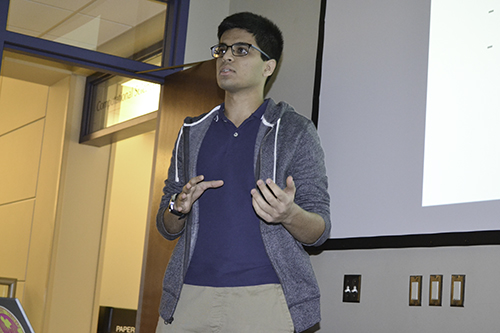
Siddharth Ahuja, mentored by Dr. Andre Schleife, presents his Lightning Talk: Incorporating Interactive Virtual Reality Technology in an Educational Environment
And not only are SPIN's projects interdisciplinary— its participants are too. Though many come from Computer Science or Electrical and Computer Engineering, participants don’t just come from other Engineering disciplines, such as Physics; many are from across campus: Accounting, Biology, Economics, Psychology, Statistics, even Semantics. Kindratenko adds that SPIN is also seeking gender diversity by increasing female participation. For instance, in the 2016–17 academic year, 29% of the involved students were females, the highest number of female students in the history of the program.
How are students matched up with SPIN research mentors? When applying, students must rank their top three preferences from among the upcoming session's projects; then mentors choose their first, second, and third choices from among the candidates that applied to their project. Regarding her role in hooking up students with the NCSA researchers, Kindratenko actually sees herself as sort of "doing match-making."
“I look not only for qualifications," she explains, "but also we ask a set of questions in our application form to see how the person is motivated or interested.” Surprisingly, a student’s GPA isn’t even requested. Students are only required to be in good academic standing; grades don’t necessarily play a role.
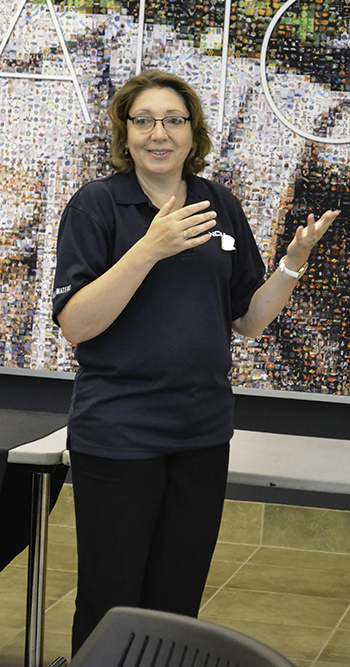
NCSA's Education and Outreach Coordinator, Olena Kindratenko
“Because sometimes it's really hard to evaluate a creative person that is interested in, for example, working for Donna Cox in her Advanced Visualization Group. So it's also about creativity; it's also about motivation; it's also about interest; and also about what students would like to get out of the SPIN experience.”
Why participate in SPIN? Kindratenko says one of the greatest benefits is, of course, the research. “I think that students have the experience to work along with top researchers at NCSA, and they're working on real projects.”
But according to Kindratenko, having a SPIN student on a project is a win-win; it’s not just beneficial for the students, but also for mentors. “They become a really vital part of those projects,” she acknowledges. “Student work is taken seriously here at NCSA. The researchers count on them; they count on their input on work being done…They see our SPIN students as a creative force at NCSA, because the best ideas are coming from undergraduate students.”
One NCSA research scientist who would agree is Volodymyr Kindratenko, who’s in charge of NCSA’s Innovative Systems Lab (ISL). And he would be the first to agree that SPIN’s goal, fostering undergrad research related to new technology, meshes quite well with that of ISL, which he calls “the place where we try new technology, and we look at how this new technology is applicable to the needs of NCSA at large, as well as the faculty and community on campus.” His research investigates "how new technology in processors, architecture, memory, and storage can improve high-performance computing.”
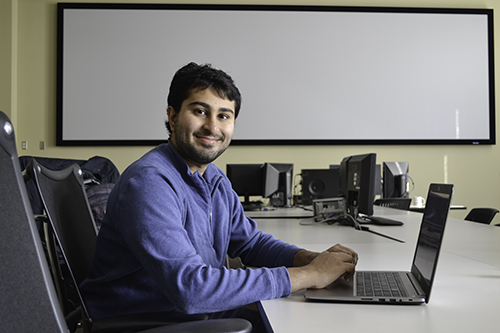
SPIN student Sujay Shah at work in the SPIN office in NCSA. Also mentored by Dr. Andre Schleife, Shah is working on the virtual reality aspect of a project about data vizualization for Schleife's Material Science course.
Regarding his interactions with SPIN, he calls the students “incredibly productive workers” and says the program gives researchers access to “highly motivated and educated students” whom he terms “very capable, and they know enough to be useful, and they are willing to work hard. So they do a good job.”
Another benefit for students is the money. Students receive paid internships ($12.50 an hour), and in exchange, do authentic research on cutting-edge topics. Another plus? Students are involved with a project from start to finish; working closely with their mentors, they must come up with their own research plan; plus, at the end of the internship, they’re expected to produce a research report.
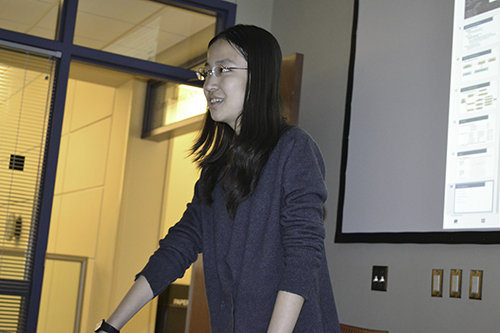
SPIN student Sijia Huo, a senior in Mathematics & Computer Science, Statistics, and Economics who is being mentored by Dr. Liudmila Mainzer, presents her Lighting Talk: Solving Complex Data Analytics Problems with Advanced Statistics
Another requirement which helps students hone their skills? Each must give at least one presentation—dubbed a lightening talk—about their project. SPIN students explain their research to fellow SPIN students and others, then respond during a Q-and-A period. This component allows students to not only talk about their projects but to also learn about other NCSA projects.
Like most summer research programs, SPIN has an eight-week summer internship. But that’s where most similarities end. Because, unlike most other undergraduate research programs on campus, SPIN works only with Illinois undergrads, which allows for another unique program component: SPIN encourages students to make more permanent relationships with their research mentors…sometimes over a period of several years. So while many programs are for the summer only, SPIN also offers internships for the full academic year. In fact, some students receive internships for both the summer and academic year over a period of a year or two.
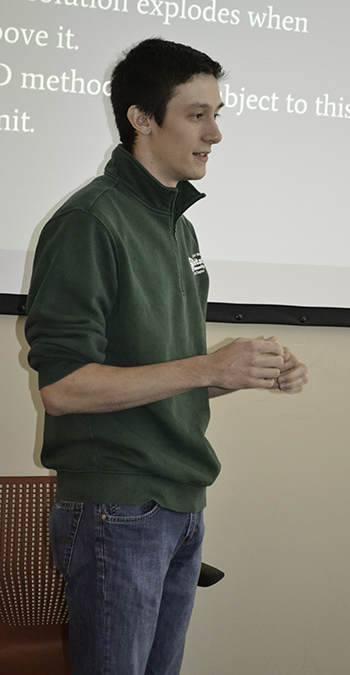
SPIN student Derek Glennon, who works with researcher Charalampos Markakis, presents his Lightning Talk: "Simulating Neutron Stars With Computational Fluid Dynamics."
Another unique characteristic of SPIN is that its funding comes not only from state funds, which can only support 15 interns financially per summer or academic year session, but some SPIN students are completely supported by their mentors. Also, SPIN might support a student for a normal work week, while his/her mentor provides support so the student can work more hours.
So why would a researcher who can afford to completely support a student go through SPIN at all? For one, it provides the researcher access to a larger pool of qualified candidates. In addition, it provides more structure, such as the above-mentioned research reports and Lightening Talks. But SPIN also provides professional development (PD) activities.
For instance, one popular SPIN PD activity is an informal meeting with the NCSA director, Bill Gropp. “Those events are really successful and popular with the students,” Olena Kindratenko explains, “because this way they can have direct access and opportunity to talk to the director. It's exciting for young professionals to talk to such an outstanding person and researcher.” SPIN also organizes other activities: a Blue Waters tour and the Advanced Visualization Lab's scientific phenomena demonstration. In fact, because of SPIN's emphasis on PD, students are paid for one hour of PD a week in order to encourage SPIN students to attend presentations done at NCSA.
However, SPIN isn’t all work and no play; students are also encouraged to socialize: do movie nights, see the Fourth of July parade. “Our students in the past developed really close relationships,” Olena says.
One measure of SPIN’s success is past students' achievements. For instance, some past interns have successfully landed their next position or decided to go on grad school because of SPIN.
Olena shares an anecdote about one student who had worked on an auto text recognition SPIN project and is currently interning at Amazon. The student told Kindtratenko, “Because of my SPIN experience, I was chosen to work on the project.”
“The success of our students is really encouraging and motivates us here at NCSA to continue this program,” she adds.
Kindratenko claims that folks at NCSA are “really proud of our SPIN students. They are really great, out-going, hard-working students. We are so lucky to have them here at NCSA, and we are always excited to talk to students about opportunities at NCSA.”
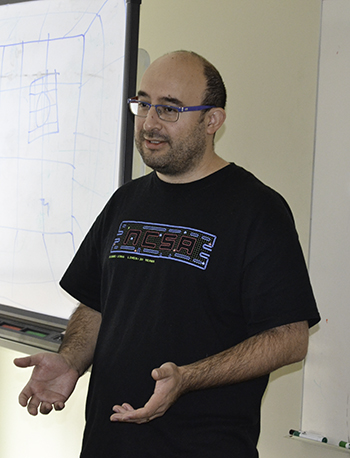
Dr. Eliu Herta gives a brief presentation during SPIN's Lightning Talks.
According to Olena, one final benefit of SPIN is the guest speakers that present during the Lightening Talks, which provide students “an opportunity to network and to expand their professional network as well.” For instance, on November 28th, Dr. Eliu Herta gave a brief presentation about his research during the Lightning Talks.
One participant who agrees that networking is one of SPIN’s greatest benefits is computer engineering senior Yan Zhan, who got involved the summer of 2016 and has been participating ever since. “It's a very good resource to work with and to network with researchers and other knowledgeable people on campus. NCSA, in general, has a particular concentration of good people to know.”
Yan also appreciates both the financial benefits, and developing relationships with other students. “Since SPIN is also a paid internship program, it’s a nice way to cover some living expenses. And it's also a good way to learn about your peers. There's a lot of brilliant students here.”
Yan also cites some additional benefits of SPIN: the people. “I mostly enjoy the working environment here, both the people and the environment in general.”
One of the people to whom Yan is referring is his SPIN mentor, Volodymyr Kindratenko. The research Yan has been doing for Volodymyr is in the area of HPC architecture: testing a box of new NVIDIA GPUs (Graphical Processing Units), which Volodymyr calls “incredibly high-performing compared to everything else that’s available.”
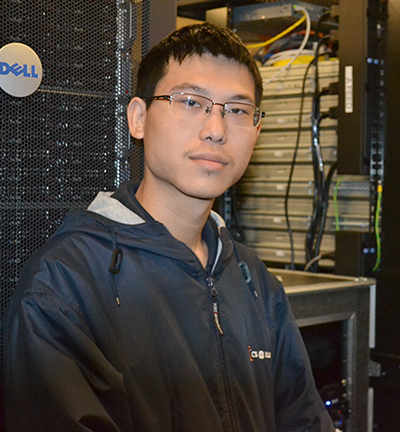
Computer Engineering senior Yan Zhan.
Yan has also dabbled in teaching; he TAs fopr Kindratenko's ECE computer engineering course. “Each time I teach a particular course, I hire him because he's very helpful,” Volodymyr explains.
Yan has been involved in quite a few projects while at NCSA. For example, he was a member of ECE’s student team that visited Washington, DC on Congressional Visit Day in late April. During this event, scientists and engineers from all over the nation go to Capitol Hill and talk to congressmen about funding for STEM education and research.
And this past summer, Yan helped provide tech support for NCSA’s Inclusion REU; working with the IT team, he helped to find resources then set up a new office for the REU students.
Also, with the help of Volodymyr Kindratenko, Zhan began the Illinois team that competed in the Student Cluster Competition held at the SC 17, a large, international, super-computing conference in mid-November 2017. This competition was created to provide undergrad students with early exposure to HPC (High-Performance Computing) and to integrate HPC education into undergraduate curricula.
Olena adds that Yan is also interested in SPIN's social activities, and has also demonstrated leadership skills. He serves on NCSA's student board, where “He provides a lot of insight.”
Yan’s current plan, once he graduates, is a job as a systems engineer in the HPC field. While he’s looking into some of the national labs, there’s another position he’s also looking into…at NCSA.
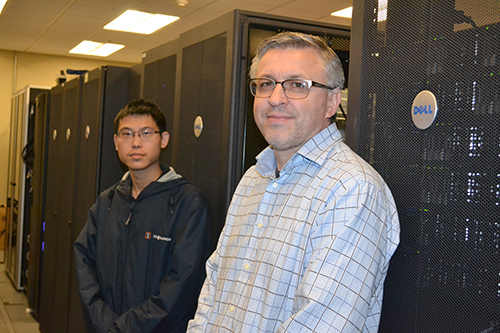
Computer Engineering senior Yan Zhan (left) and his mentor, NCSA's Volodymyr Kindratenko (right).
Volodymyr thinks quite highly of Yan, calling him “A very productive member of the SPIN team as well as the cluster competition team. He is always there to do the work, and he is always willing to do what needs to be done. He's always willing to learn something new. Everything he does now, he did not know it a year or two ago. But he's willing to go and learn this, and he's willing to commit time and build up on that. So he's working with us so he can use his new knowledge."
Based on stories like Yan Zhan's, Olena considers SPIN to be quite successful. However, she’s devised a couple of new strategies to make it even better in the future. For one, she’d like to have more grad students involved with the program, plus she’d also like to broaden SPIN’s impact campus-wide. While SPIN has students from LAS (the College of Liberal Arts and Sciences), she hopes to also recruit students from other, non-engineering colleges, like Education, Business, and Applied Arts and Design.
“We strongly feel that even on this campus, students, especially undergraduate students, are not aware of the SPIN program and about wonderful opportunities at NCSA. So we are planning to do more outreach activities in order to promote the SPIN program and also to get more attention from different departments across campus, not only engineering,” she says.
Author/Photographer: Elizabeth Innes, Communications Specialist, I-STEM Education Initiative
More: Blue Waters, NCSA, Student Spotlight, Summer Research, Undergrad, 2017
For additional I-STEM web articles about NCSA, see:













.jpg)
















